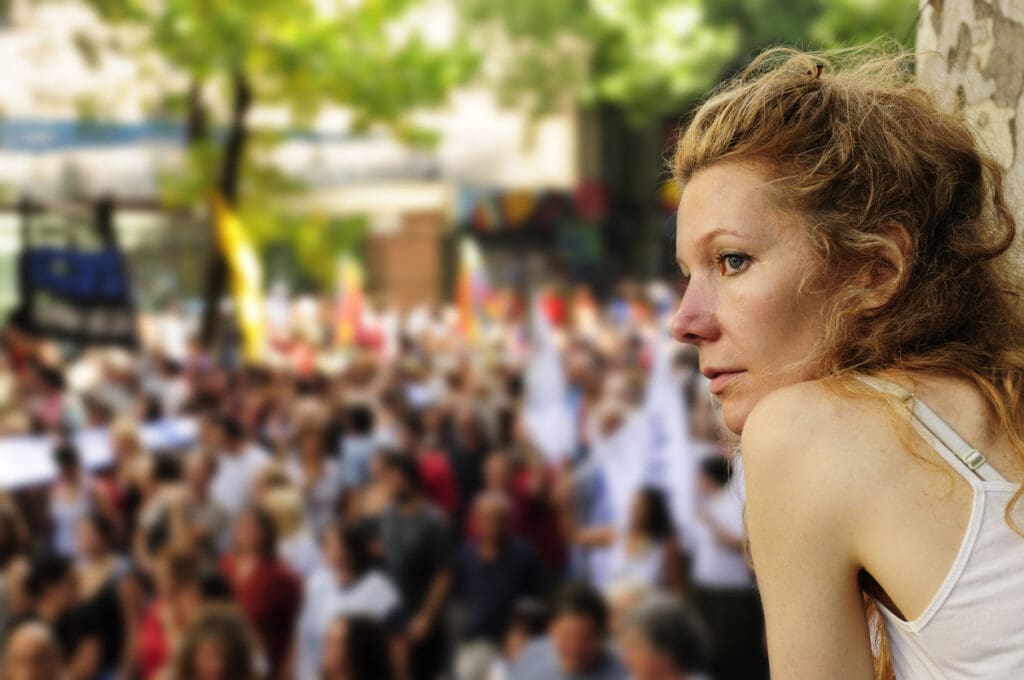
Political polarization is on the rise. In one 2022 study, more than half of respondents in 15 nations felt their countries were more divided than in the past. The feeling was strongest in the Netherlands, where 4 out of 5 people shared this opinion.
Theories abound about the roots of escalating polarization, ranging from divisive leaders to social and economic inequality. Social media, too, is credited with amplifying differences among users. Given this daunting reality and its threat to democracy, what can be done?
One researcher in the Netherlands is exploring the impact of loving-kindness meditation on such divisiveness. Femke E. Bakker received a 2019 Mind & Life PEACE Grant to study the potential impact of loving-kindness meditation on political tolerance. “Political tolerance, or the willingness to put up with the opinions and behavior of others we dislike, is regularly called the oxygen of democracy,” says Femke. “Our world, our communities, are diverse and will always be diverse. It’s up to us to start embracing that diversity and consciously start to make the effort to agree to disagree.”
“Political tolerance, or the willingness to put up with the opinions and
behavior of others we dislike, is regularly called the oxygen of democracy.”
A senior assistant professor at the Institute of Political Science at Leiden University, Femke teaches courses in political psychology and research methods. Her interest in meditation—and the psychology of politics—emerged later in her professional journey. She started her career as an actor, performing for stage and screen. She then pivoted to journalism, writing for magazines while raising two small children. An underlying theme was understanding human motivation. “I’ve always been interested in why people do what they do and think what they think,” she says.
It was during a challenging period in her life that Femke started experimenting with various meditation techniques. The practice of loving-kindness struck a chord, compelling her to share its benefits with others. She enrolled in meditation teacher training and now teaches online courses and a monthly meditation on self-gentleness on Insight Timer.
Femke highlights similarities between loving-kindness meditation and democratic principles, emphasizing the shared pursuit of a good life and the need for tolerance in diverse societies where majority rule must respect minority rights.
As a professor of political psychology, she now teaches students how psychological mechanisms drive human behavior, especially ingroup/outgroup thinking. “We all define ourselves [in terms of] belonging to a specific group,” she says. “We want to get that positive feeling of shared identity… belonging makes us feel good.” Yet that very desire to belong becomes problematic when we start to blame or scapegoat others who think differently. Femke sees great promise in nurturing self-awareness of our biases and where they come from, especially among an emerging generation of youth struggling to make sense of today’s divides.
Can Tolerance Be Trained?
Femke’s study measured political tolerance in terms of people’s willingness to extend basic human rights—a bed, a bath, food—toward illegal immigrants. It was carried out in the summer of 2021 among international students, who were randomly assigned to three seven-week trainings. One group learned to practice loving-kindness meditation, a second group learned about compassion (without practicing meditation), and a third group practiced debating skills.
Participants in each of the three groups attended six hour-long training sessions with a teacher, and were assigned a 12-minute daily task. The students in the loving-kindness group practiced that style of meditation daily for 12 minutes; the other two groups listened to relaxing music for 12 minutes a day. Levels of tolerance were measured (as described below) before and after the intervention.
Tolerance was assessed by asking participants to imagine that they were a special advisor to the government of the country they were living in. As such, each was asked to give their honest opinion about proposed policy measures related to an illegal immigrants group. The policy measures included providing illegal immigrants with free hospital treatment when ill, beds and meals at government facilities, education for their children, training in the local language, and temporary work permits, with the potential to apply for permanent jobs. Participants were asked to share their detailed and honest input about the proposed initiative and their level of sympathy for the immigrant group. In all, 83 students completed the intervention.
Findings show that all three interventions had a significant effect on levels of tolerance. The fact that participants in all three trainings—not only those who meditated—became more tolerant towards illegal immigrants, is encouraging in that it suggests that more than one road might lead to the cultivation of tolerance. Importantly, this study needs to be replicated to more clearly determine whether this finding was due to the interventions themselves, versus other factors such as re-taking the test, or societal events that may have affected all participants similarly.
Femke also investigated personality traits that are thought to influence political tolerance. Of particular note is that the loving-kindness group showed a decrease in social dominance orientation, or the degree to which a person values group-based social hierarchy, believing that some groups are “better” than others. The finding is significant, she explains, in that social dominance orientation stands at the roots of prejudice and discrimination and is generally assumed to be stable.
Next Steps
While the results of her study were far from conclusive, Femke sees great promise in continuing to pursue research in what is a pioneering area within political science. What’s encouraging is that people can change their views, and that multiple paths might lead to a similar destination in cultivating political tolerance.
Looking ahead, she plans to report her findings in an article for the Journal of Experimental Political Science, while undertaking a more in-depth exploration of the study’s results, including the effects of loving-kindness meditation on social dominance orientation. Ultimately, Femke would like to see such interventions delivered in school systems, beginning at the elementary level. Part of what she hopes to foster is greater “self-gentleness” among students and within society at-large. (See her related TEDx Talk at Leiden University.) When we are gentle with ourselves, she says, “the spillover effect is that we will be gentler to others.”


